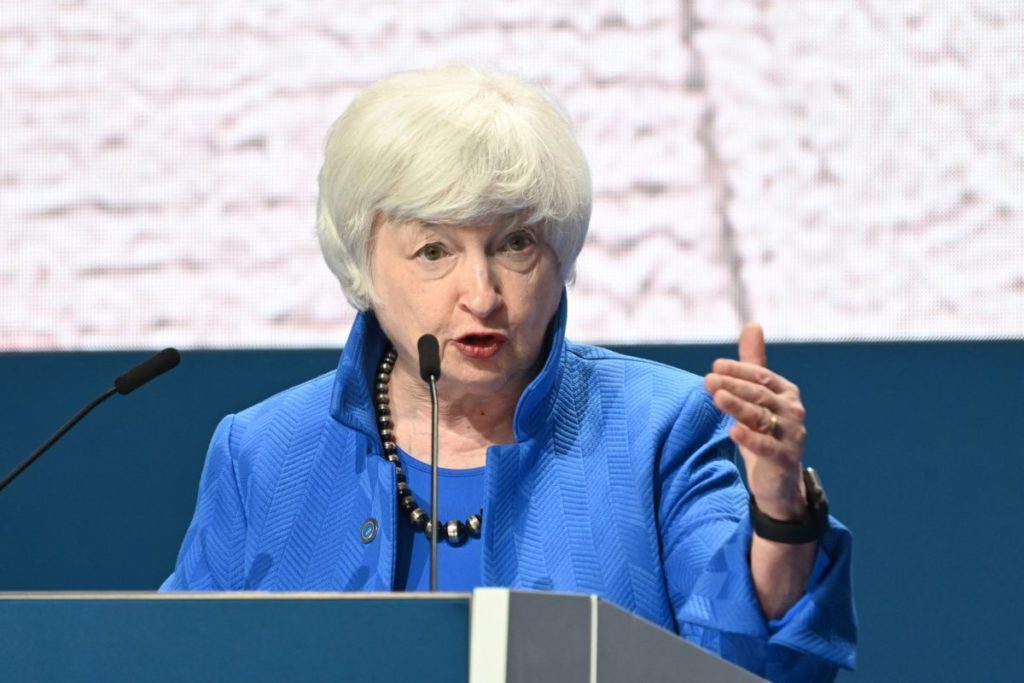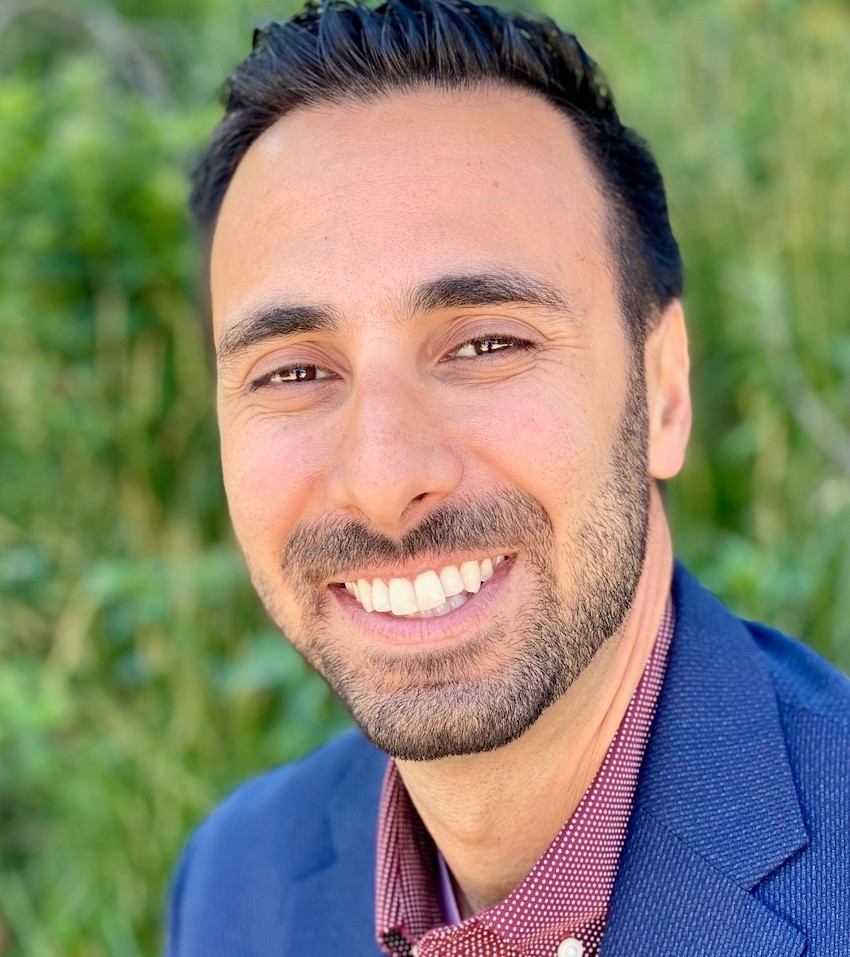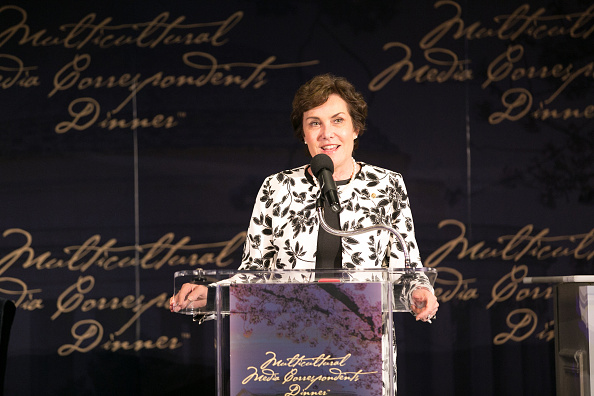Your Daily Phil: Seven House Democrats target nonprofit status of several Israel-related charities + The future of the Maccabi Games
Good Monday morning!
The JCC Maccabi Games, which was cancelled this year due to the coronavirus pandemic, is launching a $30 million endowment campaign ahead of its planned return next summer, Sam Cohen, vice president of program and talent at the JCC Association of North America, which organizes the games, told eJewishPhilanthropy.
“It’s so much more than just sports,” said Cohen, who competed in them herself as a teen tennis player. “We are always looking for a way to create Jewish memories.”
More than 100,000 Jewish teens have participated in the Olympic-style games since their founding in 1982 to foster Jewish identity while providing a forum for national competition. The Lawrence Family JCC in La Jolla, Calif., will host the games from July 31 to Aug. 5, 2022, which will also be the games’ 40th anniversary. The games will also feature a pilot initiative for teens with cognitive and developmental disabilities.
A recurring feature of the games is a commemoration, during the opening ceremony, of the Munich 11, the members of the Israeli team killed in the 1972 Olympic Games by Palestinian gunmen. That ritual helped generate momentum for the decades-long effort, successful this year for the first time, to persuade the International Olympic Committee to remember the slain athletes during the official Olympics opening ceremony.
The association has raised seed money of $1 million and has formulated a plan to raise additional funds through the creation of a donor circle focused on the games.
ON THE HILL
Seven House Democrats target nonprofit status of several Israel-related charities


ANDREAS SOLARO/AFP via Getty Images
A group of seven House Democrats critical of Israel are urging the Treasury Department to review, and possibly revoke, the tax-exempt nonprofit status of several U.S.-based pro-Israel groups due to their links to Israeli groups supporting settlements, reports Jewish Insider’s Marc Rod.
Targets: Reps. Rashida Tlaib (D-MI), Cori Bush (D-MO), Alexandria Ocasio-Cortez (D-NY), André Carson (D-IN), Mark Pocan (D-WI), Betty McCollum (D-MN) and Ayanna Pressley (D-MA) sent a letter to Treasury Secretary Janet Yellen late last month highlighting their concerns about the organizations, including the Central Fund of Israel, American Friends of Bet El Yeshiva Center, Qomemiyut and The Hebron Fund. David Friedman, the former U.S. ambassador to Israel under the Trump administration, was president of American Friends of Bet El Yeshiva Center. Leaders of Qomemiyut (which means “sovereignty” in Hebrew) include Knesset member Bezalel Smotrich and others on the hard-right in Israel.
Objection: “Tax-exempt nonprofit status allows U.S.-based 501(c)(3) entities and their U.S.-based donors to receive an effective subsidy from the U.S. government to support serious breaches of international law and violations of internationally recognized human rights related to the expansion of the illegal Israeli settlement enterprise,” the letter reads. “Granting and sustaining 501(c)(3) status recognizes and supports this unlawful conduct that is contrary to existing U.S. obligations under international law and established U.S. public policy.”
Pushback: Jay Marcus, the director of the Central Fund of Israel, rejected the lawmakers’ effort as “outrageous” and discriminatory in a statement to JI, claiming the IRS conducted an extensive audit of the organization in 2015, finding no irregularities. The group funds a rangeof charities in Israel. “CFI supports hundreds of charities in Israel and we never choose to give support or discriminate due to location… CFI is an incredibly valuable organization for Israel, extending over $35 million a year in aid to needy nonprofits in Israel, which is why radical anti-Israel members of Congress want to shut down CFI.”
AS A PROFESSIONAL
Michael Zimmerman reflects on graduate study in philanthropy


Courtesy
Michael Zimmerman, a Jewish communal professional who has worked for the Jewish National Fund, Hillel International and American Friends of the Hebrew University, will be joining The Patterson Foundation as a member of its fellowship program after earning a master’s degree from Indiana University Lilly Family School of Philanthropy. Zimmerman spoke with eJewishPhilanthropy‘s Helen Chernikoff about why he decided to formally study philanthropy, and what he hopes to learn as a fellow with the Sarasota, Fla.-based foundation.
This interview has been edited for length and clarity.
Helen Chernikoff: You’re the grandchild of Holocaust survivors. How did that play a role in your decision to enter philanthropy?
Michael Zimmerman: I grew up in New Jersey, in a suburb of New York City. I think that some of the driving factors that pushed me into philanthropy were growing up and experiencing both homophobia and antisemitism. I actually went back to Poland to retrace my grandparents’ steps. My grandmother was able to survive by working on an air force base for the Luftwaffe. She was due to go to Auschwitz but the Soviets liberated them.
My grandfather hid his identity. He fought in the Polish army and then as a prisoner of war in the Soviet army. [My grandparents] met after the war. Where I grew up, there were issues of ignorance of others. That included people who were Jewish, or LGBTQ. There was othering and harassment. Sometimes verbal, sometimes physical. Philanthropy can shape a society that leaves no one behind. I saw what had happened to my grandparents and what happened to me, in a different form, as a perpetual cycle that needs to be broken. There’s a lot of work to do.
HC: Where do you think philanthropy is challenged in pursuing this mission?
MZ: It’s challenged in engaging the next generation. It’s challenged in engaging people who don’t have major dollars but also see the gaps, and where people are falling through the cracks. People who feel like, ‘This is all horrible, but I don’t have the money to do anything about this.’
HC: And who have you seen successfully address this challenge?
MZ: It’s different for each organization, but the best way to do it is to lower the barrier to contributing and then show those contributors how they are helping. Philanthropy has got used to giving a general message of thanks to most people, and a personal message only to those biggest givers. Keshet [the Jewish LGBTQ advocacy organization] elevates the underrepresented and the underprivileged who support them. Congregation Beit Simchat Torah [the LGBTQ synagogue in Manhattan] does, too. At their gala, there’s no special place to sit, everyone is together.
HC: What were you doing before you decided to go into the nonprofit sector?
MZ: I helped a company set up its operations in Latin America, in Panama. I’d fly back at the end of the year, and we’d count up the money, and I had a hard time understanding the purpose. The general counsel, who’s a mentor to me, suggested nonprofit work. At that point I don’t think I even knew what it meant to fundraise. I started with the Jewish National Fund (JNF) and learned how to connect with lay leaders, how to build a campaign.
IT MAKES SENSE
Smashing the idol of inertia: Sunsetting the second day of holidays


eJP Archives
“Returning to the States after two years at the Pardes Institute in Jerusalem, where I first became traditionally observant, was disorienting enough. Never did I seriously entertain keeping the second day of holidays as do most traditional Jews outside of Israel. But that was way back when I was a sovereign self, beholden to nobody but me. Now I’m a rabbi at a mid-sized, suburban Conservative shul,” writes Rabbi Shai Cherry in an opinion piece for eJewishPhilanthropy.
The sun begins to set: “In Zoom Year 1, after sermonizing at Rosh Hoshana (x2), Shabbat Shuva, Yom Kippur, Sukkot (x2), and Shmini Atzeret, my d’var Torah on Simchat Torah was about sunsetting the second day of holidays (yom tov sheni). I offered the dvar as something to consider; my congregational president took it as something to pursue. And so began an eight-month, colorful sunset.”
How it began: “When Corona was still just a beer, I finished writing a book manuscript in which I identified the observance of yom tov shenias incoherent. That second day was born under a parental cloud: Were those smoke signals for the new moon from the good Rabbis or the bad Samaritans? In order to prevent those sneaky Samaritans from sabotaging our sacred calendar for those living beyond the borders of the Land of Israel, a rule was promulgated that Jewish communities outside the Land should observe a second day of each holiday to ensure observance on the proper day.”
IT REALLY DOES MATTER
Five reasons why a Jewish education in the middle grades prepares students for success


Unsplash
“The middle grades are often maligned as a source of upheaval, drama, consternation, culminating in the production of mostly proper human beings who will enter high school — likely somewhat scarred from their previous educational experiences,” writes Jody Passanisi, director of the Gideon Hausner Jewish Day School, in an opinion piece for eJewishPhilanthropy.
Challenges and opportunities: “There are many advantages to a TK-8 or K-12 Jewish day school model, but it can be just as impactful to come into Jewish education as a middle schooler. In fact, in many ways, a Jewish day school education taps into the positives of middle schoolers’ capacities, and provides opportunities for reflection and growth as they navigate the more difficult times of adolescence.”
Time to leverage: “Jewish day school in the middle grades (approximately fifth through eighth grade) can be a place where the changes of middle school are embraced and leveraged for increased reflection, growth, autonomy, communal responsibility– all through Jewish values. This helps to nurture students to be active and ethical contributors in the world.”
Worthy Reads
Ongoing Struggle: The passage of the Americans With Disabilities Act was fueled by the United States’ practice of mass institutionalization of people with disabilities, and while the chapter of history is over, discrimination against this population is still a problem, writes Sam Gill in the Chronicle of Philanthropy. Philanthropy cannot, as the law did, recognize that people with disabilities have civil rights, but foundations have a role to play in making sure its own hiring practices are inclusive, and in supporting programs that elevate people with disabilities. “What philanthropy can do is apply its flexibility, insight, and resources to advance the cause of justice for people with disabilities — as it has for people of color, women, and so many others left in the shadows of democracy’s light,” concludes Gill. [ChroniclePhilanthropy]
Days Of Rest: In Inside Philanthropy, Dawn Wolfe writes about the small group of funders who are providing sabbaticals in recognition of the pandemic’s toll on their employees, and asks them why they think more colleagues aren’t following suit. Several reported that while it’s ultimately funders’ responsibility to change the philanthropic culture of overwork, grantees can also play a role by implementing a sabbatical program at their organizations and then asking funders to support it after demonstrating its value. “We’re seeing more and more applicants who come to us and they already have a sabbatical program in place at their organization,” said Carrie Avery, executive director of the Durfee Foundation, whose sabbatical program started in 1997. “I do think that nonprofits can share the responsibility for changing the culture to carry this forward, and not sit back and wait for the magic funder to give them the award.” [InsidePhilanthropy]
Philanthropic Fight: In a court ruling that recognizes limitations to a donor’s right to privacy, unlike the recent U.S. Supreme Court decision Americans for Prosperity Foundation v. Bonta, New York Supreme Court judge Arthur Engoron has granted actor Johnny Depp’s motion to compel the American Civil Liberties Union (ACLU) to reveal whether Depp’s ex-wife, actress Amber Heard, has donated $7 million to the organization as she promised, reports Thomas Hitchen in Inside The Magic. This recent ruling is part of a sprawling legal battle between the two stars, including mutual allegations of domestic violence and a $50 million defamation lawsuit from Depp against Heard. Engoron ruled that the ACLU does not need to reveal information pertaining to Heard’s role as a brand ambassador for the organization, but he granted 23 other subpoena requests from Depp’s legal team. [InsideMagic]
Community Comms
Be featured: Email us to inform the eJP readership of your upcoming event, job opening, or other communication.
Word on the Street
Craig Newmark Philanthropies announced an additional $100,000investment in MAZON: A Jewish Response to Hunger to fund the organization’s efforts to remove barriers to food and nutrition for military families… Lorelei Williams has been appointed the first executive director of the Warner Music Group / Blavatnik Family Foundation Social Justice Fund… The University of California, San Diego announced a $10 million gift from Daniel and Phyllis Epstein in support of an open-air amphitheater… The Ford, Skoll, and Compton foundations announced the launch of a donor collaborative to help strengthen the impact of moving image storytelling… The Jewish Film Institute announced the six projects that have been selected for the second cycle of JFI’s Completion Grants Program… With only three days left until campers were scheduled to go home, Herzl Camp abruptly ended the summer Saturday night after a number of positive COVID tests across four of the five camp programs… Hillel International and Anti-Defamation League are joining forces to work collaboratively on several initiatives starting in the new academic year to proactively address the rise in antisemitic activity on campus…
Pic of the Day


University of Central Florida
The University of Central Florida’s Flying Horse Editions printmaking studio has selected eco-feminist artist Mira Lehr, 86, as its latest artist-in-residence. The work she creates will debut during Art Basel Miami Beach 2021.
Birthdays


Brian Stukes/Getty Images
U.S. Senator from Nevada, Jacklyn Sheryl “Jacky” Rosen…
Jerusalem born actor who moved to the U.S. as a child, has appeared in over 400 TV episodes, Nehemiah Persoff… Co-founder and chairman of NYC-based real estate development firm, Rockrose Development Corporation, Henry Elghanayan… Professor emeritus of Bible at London’s Leo Baeck College, Jonathan David Magonet… Former member of Knesset, he is presently chairman of Rafael Advanced Defense Systems, Uzi Landau… Retired colonel in the U.S. Army and a recipient of the Medal of Honor and seven other medals, he taught at West Point and serves as a military analyst for NBC News and MSNBC, Jack H. Jacobs… Nationally syndicated radio talk show host, author and public speaker, Dennis Prager… Ambassador and Permanent Representative of Canada to the United Nations, Robert Keith Rae… Op-Ed columnist for the International New York Times, Roger Cohen… Mayor of St. Petersburg, Florida, Richard David “Rick” Kriseman… Owner of Newton, Massachusetts-based MPG Promotions, Elliot Mael… VP and General Counsel of Yeshiva University, Andrew J. ”Avi” Lauer… Former ATP professional tennis player, Aaron Krickstein… Former member of the Knesset, Leon Litinetsky… SVP of sales for Hearst Television, Eric J. Meyrowitz… Senior director for global trade and public affairs at confectionery, food, and pet care firm, Mars Inc., Jay Eizenstat… Pulitzer Prize-winning, DC-based national security reporter for The New York Times, Matthew Rosenberg… Executive communications and internal communications manager at Google, Stephen L. Rabin… CEO of Make It Real, founder and chair of The Jewish Entrepreneur mentoring program, Isaac “Zevy” Wolman… Senior director of special projects at the Foundation for Defense of Democracies, Julia Nayfeld Schulman… Actress who starred in a 1999 “Pepsi Girl” commercial, Hallie Kate Eisenberg…
Email Editor@eJewishPhilanthropy.com to have your birthday included.








